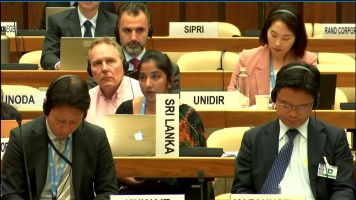
As this is the first time my delegation takes the floor, we wish to congratulate you and assures you of our full support as we approach the final stage of this year’s GGE which we believe marks a significant turning point on the future direction on the issue of regulation of the use of autonomy in weapon systems.
In this light we commend the significant efforts you and your team have put on in presenting the draft report of the 2023 session which we consider as a good basis to commence our work for this session.
We agree that there are number of points of convergence that renew our hope for the important and urgent issue of regulation of LAWS, yet at the same time we also feel that we still have long way to go to achieve consensual understanding on the inherent danger these weapon systems pose to humanity and the urgent need to adopt binding legal limitations in the form of prohibitions and regulations.
With regard to para 18 and 19, we support the inclusion of the technology neutral approach and the explanation on what this approach entails. While the debate on an exact definition on LAWS should not stand in the way of making progress in our discussions, we agree that a functional approach on characterization of LAWS would be helpful. We note however that the phrase without further human intervention in para 19 could mean that any human intervention even if such intervention does not make any substantive impact on the decision already taken by the system may make such a weapon systems fall outside the characterization of autonomous weapons.
In para 20, the reference to IHL as the only applicable legal framework to autonomous weapon system is something that appears as a set back for us from our understandings based on the previous discussions. Serious ethical and moral issues as well as challenges posed to the human dignity associated with autonomous weapon systems are issues my delegation has raised along with many other delegations in this forum over the years and we are concerned that this important aspect is not duly reflected in this paragraph.
Furthermore, larger context of international law beyond principles of IHL remains relevant and applicable to autonomous weapon systems which includes IHRL and the UN Charter.
On para 20 we note that while the requirement to adhere to principles of IHL in the development, deployment and use of LAWS is included, the word “development” is missing in the next section on prohibition of LAWS the effects of which cannot be anticipated and controlled. We consider that it is equally important that weapon systems of which the effects cannot be anticipated or controlled must not only be used but should not also be developed.
Furthermore, it is the view of my delegation that the prohibitions on the development, deployment and use of AWS should not only be limited to instances of violation of IHL principles of distinction, proportionality and precautions in attack but also in situations where such weapon systems are not predictable, reliable, explainable and understandable. In this sense we request that these requirements included in para 21(d) be moved to para 20 as weapon systems that do not contain these characteristics cannot be in compliance with IHL.
We do not agree with the argument that these requirements pose new regulations that are not required under IHL, rather, it is our conviction that these requirements ensure that IHL is progressively developed to respond to evolving military technologies. Further it is essential that these requirements provide additional legal clarity on the application of IHL since IHL was traditionally designed to apply to weapon systems that are used under human control.
Thank you Mr. Chair